|
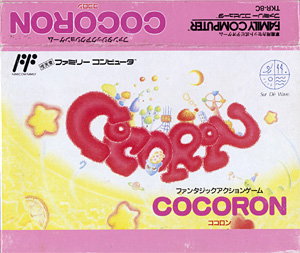
|

|
|
ココロン
©1991 Takeru
Release: 1991-05-03 (¥6500)
Cartdridge TKR-8C
Platform game
|
Cocoron is a side scrolling platform game developed by Takeru.
Tapir, an enigmatic blue wizard in spotted pajamas from the Dream World,
sends the player on a quest to rescue princess Rua. But things quickly become
more complicated and the player soon has to rescue other characters along the way,
such as Santa Claus, the king of Trump castle and the blue fairy Cocoron.
Tapir can manipulate people's dreams and this ability gives Cocoron an unique
twist - the player can assemble his own character by combining one of the eight available
heads to one of the eight available bodies (which both include several designs to choose
from, resulting in literally hundreds of combinations! ). More than a mere physical
appearance, each part also defines the character's attributes, such as his health,
speed, how high he can jump and so forth. As a rule of thumb, heavier characters
are slower than light ones, but have more health and resistance. There is also a list of
eight different weapons to choose from (from boomerang to shurikens,
umbrellas and music notes). They all come with different attack patterns
and strength - some shoot straight whereas others fire along an arc or explode on contact.
They can also be powered up, and collecting five power icons (symbolized by
the weapon in use) upgrades the weapon to the next level (up to a maximum of five times).
Colored eggs are scattered around each stage or left behind by defeated enemies - cracking
them open release all kind of items, such as health, extra lives,
weapon power-ups and colored orbs. The latter trigger special events - some
power up the active weapon for a short amount of time, whereas others allow the player to control
slides, grant him invincibility or refill his health bar.
Cocoron features a world map and is divided into five different areas - the player
is free to play them in any order and, interestingly, stages change in function of the sections
he travels through. Finally, up to six different characters can be created and stored, and
returning to the house at the center of the map allows to switch between them.
|
|
Cocoron was fan-translated in English by Akujin in 1999.
|
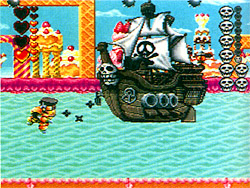 A sequel/remake of Cocoron was announced for the PC Engine Super CD Rom
system in 1993. The game, called PC Cocoron (picture on the right), was apparently completed and previews appeared
in several Japanese video game magazines at the time (see the Omake section). It also included the character customization
featured in the original game - eight heads and eight bodies to choose from, as well as eight
different weapons (some of them are different than the Famicom version though).
However, and for inexplicable reasons, it was never officially released
(maybe because of Takeru's demise). Several prototypes of the game seem to exist in Japan,
but as of today, they were never released to the public. For this reason, PC Cocoron is
still one of the most sought after PC Engine unreleased game.
A sequel/remake of Cocoron was announced for the PC Engine Super CD Rom
system in 1993. The game, called PC Cocoron (picture on the right), was apparently completed and previews appeared
in several Japanese video game magazines at the time (see the Omake section). It also included the character customization
featured in the original game - eight heads and eight bodies to choose from, as well as eight
different weapons (some of them are different than the Famicom version though).
However, and for inexplicable reasons, it was never officially released
(maybe because of Takeru's demise). Several prototypes of the game seem to exist in Japan,
but as of today, they were never released to the public. For this reason, PC Cocoron is
still one of the most sought after PC Engine unreleased game.
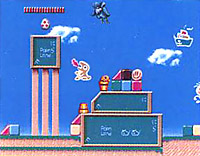 But the Cocoron story certainly didn't end there, read on. Another sequel/remake was announced for the
Sega CD around 1993 (picture on the left). The game, known as Pop'n Land, was also developed by Takeru and was
supposed to be published by Sur Dé Wave (Takeru's publishing label). Like with the original Cocoron,
players could customize their characters, but this time they could do it from a list of sixteen different heads,
bodies and weapons (for a total of 4096 different combinations!). The game was announced in
Electronic Gaming Monthly (issue 51, Decembre 1993) and in the French magazine
Joypad (issue 27, January 1994). However, and for reasons maybe due to Takeru's demise in 1994, it
followed the same fate than PC Cocoron and was never officially released, and, as of today, no
prototypes have ever surfaced.
But the Cocoron story certainly didn't end there, read on. Another sequel/remake was announced for the
Sega CD around 1993 (picture on the left). The game, known as Pop'n Land, was also developed by Takeru and was
supposed to be published by Sur Dé Wave (Takeru's publishing label). Like with the original Cocoron,
players could customize their characters, but this time they could do it from a list of sixteen different heads,
bodies and weapons (for a total of 4096 different combinations!). The game was announced in
Electronic Gaming Monthly (issue 51, Decembre 1993) and in the French magazine
Joypad (issue 27, January 1994). However, and for reasons maybe due to Takeru's demise in 1994, it
followed the same fate than PC Cocoron and was never officially released, and, as of today, no
prototypes have ever surfaced.
|
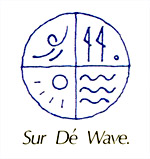 The story behind the little-known developer Takeru is really interesting. Takeru was
apparently a company originally operating toy stores, but sometime around 1989 or 1990, they decided to delve
into the video game market. The video game developer (and their publishing name 'Sur Dé Wave')
was staffed mainly by ex-Capcom employees, such as Shinichi Yoshimoto (Makaimura,
Bionic Commando, Mega Man 2...) , Akira Kitamura (Mega Man) and
Kouichi Yotsui (Strider Hiryū). Their first success was Akira Kitamura's
Cocoron for the Famicom (version tested here). However, some of the games that followed
were not as successful as hoped, such as Kouichi Yotsui's adventure game Nostalgia 1907
(Sharp X68000, Sega CD, NEC PC-9801 and FM Towns). Sur Dé Wave's
financial situation became soon unstable and Kouichi Yotsui felt partially responsible and
decided to leave. One of the last game published by the company was the excellent
Seirei Densetsu Lickle (aka Little Samson) released for the Famicom system
in 1992 by Taito. Despite its excellent production values, the game was not a hit and the
developer closed in 1994, after releasing their last games The Golem Master
(PC-98, 1993) and Rejection Cyber Girl (FM-Towns, 1993). Interestingly,
many employees later joined Mitchell Corporation (better known for their
Pomping World/Pang series).
The story behind the little-known developer Takeru is really interesting. Takeru was
apparently a company originally operating toy stores, but sometime around 1989 or 1990, they decided to delve
into the video game market. The video game developer (and their publishing name 'Sur Dé Wave')
was staffed mainly by ex-Capcom employees, such as Shinichi Yoshimoto (Makaimura,
Bionic Commando, Mega Man 2...) , Akira Kitamura (Mega Man) and
Kouichi Yotsui (Strider Hiryū). Their first success was Akira Kitamura's
Cocoron for the Famicom (version tested here). However, some of the games that followed
were not as successful as hoped, such as Kouichi Yotsui's adventure game Nostalgia 1907
(Sharp X68000, Sega CD, NEC PC-9801 and FM Towns). Sur Dé Wave's
financial situation became soon unstable and Kouichi Yotsui felt partially responsible and
decided to leave. One of the last game published by the company was the excellent
Seirei Densetsu Lickle (aka Little Samson) released for the Famicom system
in 1992 by Taito. Despite its excellent production values, the game was not a hit and the
developer closed in 1994, after releasing their last games The Golem Master
(PC-98, 1993) and Rejection Cyber Girl (FM-Towns, 1993). Interestingly,
many employees later joined Mitchell Corporation (better known for their
Pomping World/Pang series).
|
Game Staff (Copied from the introduction sequence) :
|
Character Designer
Utata Kiyoshi
Yossan Part2
Yuka Kumagai
Takehiko Tamada
|
|
Music Composer
Yoshiji Yokoyama
Takashi Tateishi
|
|
Programmer
Akihijo Ohta
Tsukasa Chibana
|
|
Directer
Akira Kitamura
Produced by
K2
|
|
G
O
O
D
I
E
S
|
|
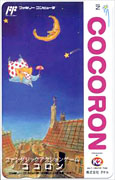
Japanese Phonecard
|
|
|
O
M
A
K
E
|
|
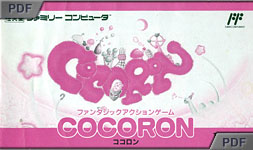
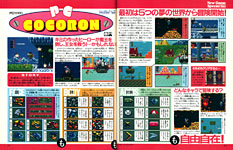
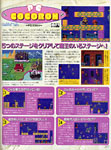
|
|
|
Click on picture to enlarge |
|
|
|
LK

|
|
Add your Pov here !
|
P
O
V
s
|
|
"Wow" are the best three letters describing Cocoron. This game takes the
platform genre and flips it on its head, creating a really unique and especially
innovative experience. The character customization is a really neat gameplay idea
and gives the game incredible depth and replay values. The game's structure is also
what distinguishes Cocoron from its peers - stage's layouts are determined by
the sections you travel through, and although this can be a little confusing at first,
this brings an substantial amount of variation to a game that is already a high-achiever
in this field. All the characters also control perfectly (which is amazing if you think
about it), and while the soundtrack is not astonishing in itself, it fits the game really well.
All in all, Cocoron is an excellent platform game, and one of the most innovative and unique
game I've played in a long while.
|
|
|
|